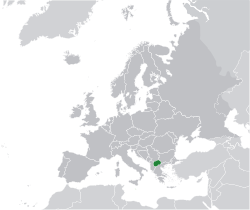
Capital punishment in North Macedonia is prohibited by its Constitution.
Article 10 of the 1991 (amended in 2001) Constitution of North Macedonia states: [1]
- "The human right to life is irrevocable. The death penalty shall not be imposed on any grounds whatsoever in the Republic of Macedonia."
North Macedonia is a member of the Council of Europe. It has also signed and ratified Protocol No.13 Archived 2015-10-07 at the Wayback Machine .